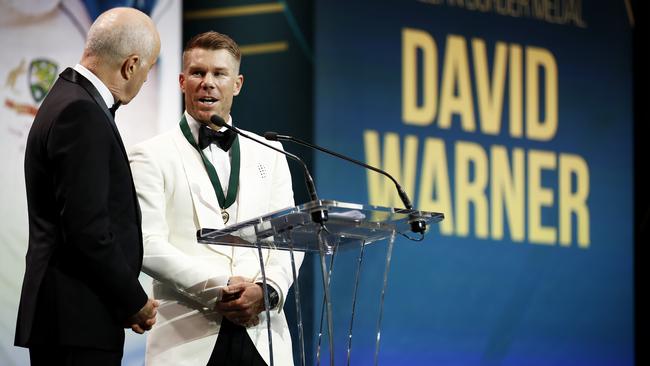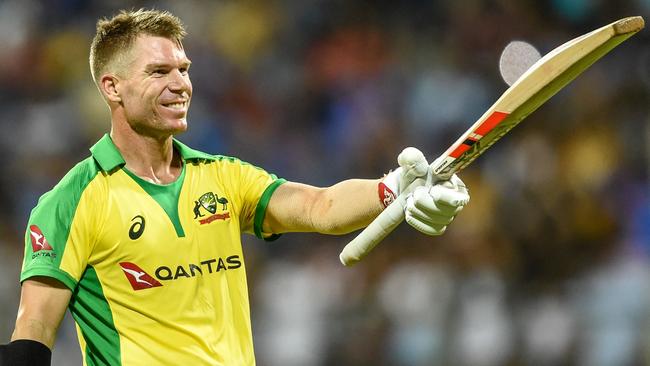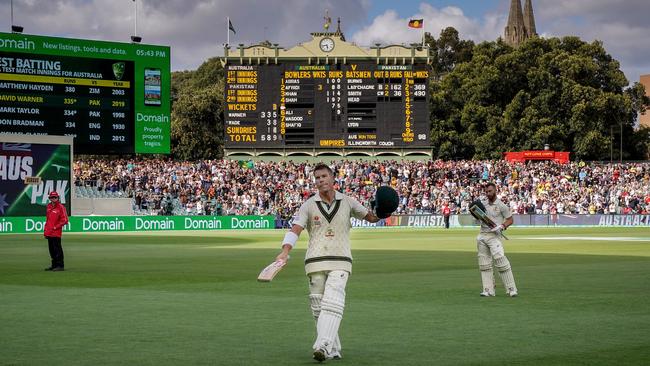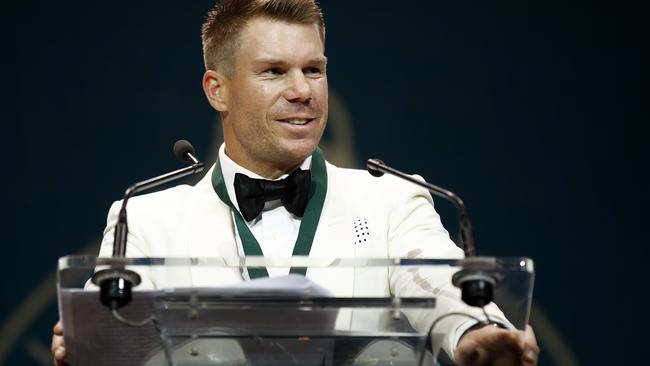Debate over David Warner win at least shows Allan Border Medal still means something
David Warner’s poor Ashes campaign didn’t sink his Allan Border Medal hopes, and nor should it have. Like it or not the batsman was a deserved winner in what is an imperfect system.
Cricket
Don't miss out on the headlines from Cricket. Followed categories will be added to My News.
The Australian Cricket Awards got what it’s been craving on Monday night, a tablespoon of controversy.
David Warner winning - and in the process polarising opinion - is a good result. This is what the medal has been missing for two decades.
Watch LIVE coverage of the best international & domestic cricket on KAYO with FOX CRICKET’s unmatched commentary line-up. New to Kayo? Get your 14-day free trial & start streaming instantly >
It was only a few years ago that interest had reduced so much in the night formerly known as the Allan Border Medal, that it was raised whether the concept should continue.
Players were emphatic they wanted The Medal to stay, and like it or not, Warner is a deserved winner.

Warner’s emotional speech showed how much the recognition meant to him after his 12 months of banishment and turmoil, and equally the social media reaction – both good and bad – showed that the punters cared as well.
And for it to mean something is all you can ask for with a major award like this, because there is no perfect system.
Much of the public scepticism has centred on how Warner could be crowned player of the year, when in the centrepiece Test series of that period, the Ashes, he had a stinker.
It’s a fair criticism – and Warner himself took the extraordinary step of apologising for his performance in England on stage on Monday night.
But it’s worth pointing out that the coldest and hardest judges of all, the bookies, devoid of all sentimentality, had Warner the short-priced favourite to take out the award.
Therefore his win was hardly the turn up of the century, especially when the batsman dominated the World Cup, which some would argue was a more heavy duty event than the Ashes in 2019.
Most would agree that Test cricket should be weighted higher … and guess what, it is, by some margin.
Test votes are given a weighting of six, compared to one-day cricket which is given a weighting of three, and then Twenty20 cricket which comes with a weighting of two.

The best explanation of what likely happened on Monday night is that Steve Smith with his Ashes heroics, Marnus Labuschagne with his golden summer, David Warner with his decimation of Pakistan and Pat Cummins with his unyielding consistency, in many ways, cancelled each other out on Test match votes.
So then it came down to the white ball formats to decide the AB winner, and on that front, there can be no argument that Warner was the No.1 Australian player of the year.
Ashes batting of AB Medalists in winning year
— Swamp (@sirswampthing) February 10, 2020
2002 MHayden 234 runs 33.4 avg
2003 AGilchrist 333 55.5
2006 RPonting 359 39.9
2007 RPonting 576 82.3
2010 SWatson 240 48.0
2011 SWatson435 48.3
2014 MJohnson 165 27.5
2016 DWarner 418 46.4
2018 SSmith 687 137.4
2020 DWarner 95 9.5
A big World Cup, a cyclone of runs leading into a home summer which he came into under pressure, and then a triple century at Adelaide Oval is an impressive body of work to accrue after 12 months in isolation, by anyone’s measure.
Warner’s Ashes performance might leave an uneasy feeling for some, particularly with Pat Cummins finishing nine votes back in the final tally, but to suggest the system needs to be overhauled to better reward ‘marquee series’ would open a can of worms which would solve nothing.

Firstly, New Zealand was Australia’s highest ranked opponent in Test cricket this past year, not England.
And even more to the point, Steve Smith only missed out on sharing the Medal with Warner by one solitary vote.
That shows that the Ashes was given enormous credence in the voting – because outside of the five Tests against England, Smith was relatively quiet by his ridiculous standards. Yet, he almost won.

Cricket is a different scene to other sports with its different formats and different opponents and different conditions – and for that reason, it’s not just an Ashes award.
Rather than focus on the Ashes anomaly, the more reasonable question to ask in a year where Pat Cummins finished the world’s leading wicket-taker by the length of the straight, is whether the system is too biased towards batsmen?
David Warner has now won three Allan Border Medals, an amazing performance when you consider that Don Bradman never even won it once.
— Brydon Coverdale (@brydoncoverdale) February 10, 2020
The fact only four bowlers have won the award in two decades would suggest it might – although that’s no different to the Dally M’s favouring of spine players in the NRL, or the Brownlow almost exclusively going to midfielders.
The 3-2-1 voting system has no nuance or consciousness – but the key point is we’re still talking about the winner.
That shows David Warner was a good result for cricket.
Originally published as Debate over David Warner win at least shows Allan Border Medal still means something
